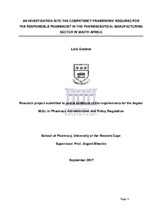An investigation into the competency framework required for the responsible pharmacist in the pharmaceutical manufacturing sector in South Africa
Abstract
The pharmaceutical manufacturing sector operates within a highly regulated
environment, with companies accountable to South African statutory bodies. The
responsible pharmacist (RP) is responsible for their company’s adherence to the
legislation requirements. Whilst the Pharmacy and the Medicines Acts outline the RP’s,
there is no mandatory training requirement prior to registration as an RP, nor thereafter.
This study investigated the role and competencies required of newly registered RPs in
meeting their professional responsibilities in the pharmaceutical manufacturing sector.
An online survey questionnaire elicited responses from RPs (n=102) about views and
perceptions pertaining to their role and responsibilities. In addition, semi-structured
interviews were conducted with statutory (n=3) and non-statutory representatives (n=5).
Survey findings indicated that the majority (89,5%) of RPs felt competent and that they
possessed the necessary skills and training. Almost two-thirds of respondents (63,2%)
were experienced RPs who shared some reservations, that RPs may be excluded from
far-reaching decisions with potential consequences for the company and patients. They
added that RP performance monitoring was not regular, which may indicate that some
companies view the RP as an appointment of convenience. The majority of respondents
(89,5 %) were in favour of the development of training guidelines
Findings from the semi-structured interviews indicated that RPs were not fully aware of
their scope of duties and the implications thereof. The interviewees were also concerned
that some companies, by not giving the RP role the level of importance and authority it
required, were practicing tokenism. Further, that not all RPs had the necessary in-depth
knowledge of the applicable laws, regulations, guidelines and codes.
A competency framework for newly appointed RPs is needed to streamline their roles and
responsibilities in the pharmaceutical manufacturing sector

